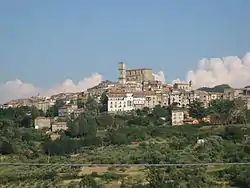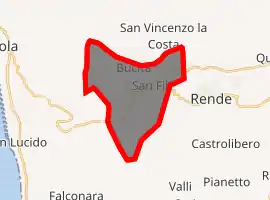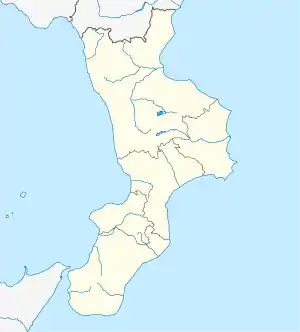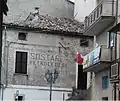San Fili
San Fili is a town and comune in the province of Cosenza in the Calabria region of southern Italy.
San Fili | |
|---|---|
| Comune di San Fili | |
 | |
Location of San Fili 
| |
 San Fili Location of San Fili in Italy  San Fili San Fili (Calabria) | |
| Coordinates: 39°20′N 16°9′E | |
| Country | Italy |
| Region | Calabria |
| Province | Cosenza (CS) |
| Frazioni | Bucita, Frassino, Cozzi |
| Government | |
| • Mayor | Antonio Argentino |
| Area | |
| • Total | 20 km2 (8 sq mi) |
| Elevation | 566 m (1,857 ft) |
| Population (2018-01-01)[2] | |
| • Total | 2,559 |
| • Density | 130/km2 (330/sq mi) |
| Demonym(s) | Sanfilesi |
| Time zone | UTC+1 (CET) |
| • Summer (DST) | UTC+2 (CEST) |
| Postal code | 87037 |
| Dialing code | 0984 |
| Patron saint | St. Francis of Paola |
| Saint day | 12 October |
| Website | Official website |
Geography
The town is bordered by Marano Principato, Montalto Uffugo, Paola, Rende, San Lucido and San Vincenzo La Costa.
San Fili is 566 meters above sea level.
History
The town once called Felum later became Terra Sancti Felicis, in honor of San Felice, to whom the population was devoted to the parish church of that time. The denomination San Fili took place later and in the fifteenth century, the town became part of the county of Rende belonging to the Adorno Doges of Genoa from 1445 to 1529. From 1532 Rende (and therefore San Fili) was raised to the marquisate and included to Ferrente de Alarcone.
San Fili has a fraction and two districts of certain importance: the Bucita fraction and the Frassino and Cozzi district. They made it illustrious San Fili: Vincenzo Miceli (1858-1928) a professor of Constitutional Law and then of Philosophy of Law in the University of Pisa, Palermo, and Perugia, and again Alfonso Miceli, his brother (1855-1940) president of the Court of Appeal of Naples, both natives of San Fili and belonging to the homonymous baronial family of the Miceli of Serradileo. In more recent times by Baron Marcello Miceli (1918-1992) Gentleman of His Holiness Paul VI, John Paul I, and John Paul II, and Knight of Grace and Devotion of the Sovereign Order of Malta.
Several Sanfilesi have emigrated to Canada and the United States, and a significant number also to South America (Argentina and Brazil above all), as well as many emigrants to European countries such as Germany and Switzerland. Today the descendants of Sanfilesi emigrants are a large number; an example is a Canadian community which appears to have reached 6,000 units.
Monuments and places of interest
Religious architecture[3]
- There are documents of the church Madre Santissima Annunziata which attest to its presence as early as 1304. Don Saverio Ricciulli of Rogliano through a project of reconstruction and advancement of the church between 1748 and 1802 improved its structure. The church is made up of a Latin cross plan with three naves and a Baroque facade. The interior is composed of a carved wooden choir and excellent late eighteenth-century works. Notable are a crucifix by Frangipane of excellent workmanship and the works on four paintings by the Evangelists by the sanfilese Antonio Granata. The bell tower on the side of the church damaged over time by earthquakes, consists of a large clock built in the early nineteenth century by the Blasi brothers.
- The church of the Retreat[4] formerly called Santa Maria degli Angeli, a 17th-century building. Used in the 19th century by the Retreating Fraticelli and used as a church with an adjacent cemetery towards the end of the 19th century. Inside the most important works are the statue of the Madonna degli Angeli made by a pupil of Gagini, and a processional wooden crucifix from the 1600s. The church reopened in 1996 after being restored for damage due to the earthquake over the years 80.
- The church of the Holy Spirit is located in the homonymous district, the structure of the same is a single nave of the early seventeenth century, with a bell tower and a tuff baroque portal. Above the portal, there is a painting of San Francesco di Paola from 1854 produced after surviving unscathed from the earthquake. The most important works inside a wooden bust of San Francesco di Paola, the canvas by Antonio Granata and some frescoes by Raffaele Rinaldi.
- The church of Sant'Antonio Abate built in the 16th century was used over the centuries for disparate uses, of artistic importance above all for the exposed wooden beam ceiling and the remarkable painting by Raffaele Rinaldi.
- The church of the Carmine built between 1919 and 1920 by the will of Don Salvatore Apuzzo, who engaged in the collection of offerings in the Sanfilese population and in the surrounding villages for its construction and for the subsequent arrival of the statue of the Madonna currently present.
- The church of Santa Lucia[5] built towards the end of the nineteenth century on what remained of an ancient chapel, in the area where the abbot Joachim of Fiore preached in the twelfth century.
 Mother Santissima Annunziata church
Mother Santissima Annunziata church Portal of the Mother Santissima Annunziata church
Portal of the Mother Santissima Annunziata church Interior of the Mother Santissima Annunziata church
Interior of the Mother Santissima Annunziata church Spiral staircase in the Mother Santissima Annunziata church (XVIII century)
Spiral staircase in the Mother Santissima Annunziata church (XVIII century) Church of the Retreat or Santa Maria degli Angeli
Church of the Retreat or Santa Maria degli Angeli Interior of church of the Retreat
Interior of church of the Retreat Church of Immacolata Concezione
Church of Immacolata Concezione Church 0f Saint Francis of Paola or church of the Holy Spirit
Church 0f Saint Francis of Paola or church of the Holy Spirit Interior of church of the Holy Spirit
Interior of church of the Holy Spirit Church of the Carmine
Church of the Carmine Church of Saint Lucia
Church of Saint Lucia
Other
Situated in San Fili's main piazza is the Monument to the Fallen. At the base of this carrera marble statue are the names of all residents who died during the First and Second World Wars. This monument was made by the sculptor Lion Tommasi de Pietrasanta.
 Monument to the Fallen
Monument to the Fallen Panorama
Panorama Old Town
Old Town Corso XX Settembre
Corso XX Settembre Written from the fascist era
Written from the fascist era Via Casalini (Bucita)
Via Casalini (Bucita) Via G. Miniaci (Bucita)
Via G. Miniaci (Bucita) Statue of Saint Francis of Paola
Statue of Saint Francis of Paola An alley of San Fili
An alley of San Fili Piazzetta degli Emigranti
Piazzetta degli Emigranti
Culture
Events
"Notti delle Magare" is an event aimed at making the culture and popular tradition of the territory of San Fili known and valued, which revolves around a very thick element, namely the "Magare", figures around which traditions revolve and ancient legends. It takes place in the historic center of the village and is characterized by literary prizes, artistic performances, artisans, and culinary festivals with the preparation of typical products.
Infrastructure and transport
The SS107 (State road 107) Silana Crotonese connects the territory of San Fili in less than twenty kilometres: to Cosenza, the University of Calabria, the A2 Rende - Cosenza north highway, and Paola. The main road is via XX Settembre, which branches off at its endpoint: on the right in the provincial road that arrives at Montalto Uffugo, continuing for about 300 meters to take the SS107, while continuing straight on go up towards the Crocetta.
People
Former WWE star Santino Marella stated in his debut appearance in 2007 that he came from San Fili.[6]
References
- "Superficie di Comuni Province e Regioni italiane al 9 ottobre 2011". Istat. Retrieved 16 March 2019.
- "Popolazione Residente al 1° Gennaio 2018". Istat. Retrieved 16 March 2019.
- http://web.tiscali.it/sanfili/chiese.htm
- http://www.italiavirtualtour.it/dettaglio.php?id=95987
- http://www.visitcosenza.it/it/san-fili
- "Santino Marella's WWE debut". YouTube. WWE. 26 September 2013 [First aired 16 April 2007].
